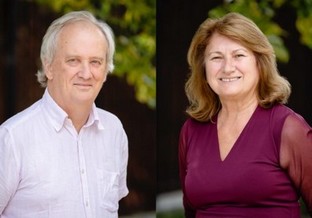
Plenary sessionsHervé Adami, Atilf, Université de Lorraine & CNRS The appropriation of knowledge by the working classes: a never-ending struggle? ---------- Hervé Adami is a Professor at the University of Lorraine and a member of the ATILF laboratory (Analyse et Traitement Informatique de la Langue Française – Analysis and Computer Processing of the French Language). He is co-head of the research group Language, Work and Training. His research interests focus on language teaching and sociolinguistics. In the field of language education, he works on the relationship to language among adults experiencing linguistic insecurity, as well as on the language training programmes designed for them. In the area of sociolinguistics, Hervé Adami is particularly interested in language ideologies and language policies. Academic website: https://perso.atilf.fr/hadami/ ****************
Bill Cope & Mary Kalantzis, University of Illinois, Urbana-Champaign
Language Learning after Generative AI This talk explores how Generative AI is transforming the purposes and practices of language learning. As AI increasingly enables seamless real-time translation and voice mediation, traditional functional motivations for learning another language are challenged. Yet instead of making language learning obsolete, AI shifts its roles and pedagogies. We argue that AI can support linguistic diversity, empower minority and heritage languages, and expand access to multilingual communication. We distinguish human language understanding from AI’s statistical text-processing, emphasizing that AI lacks embodied meaning and human agency. Using the multiliteracies framework, our presentation proposes a pedagogy that blends experiential immersion, conceptual explanation, critical analysis, and creative application. In support of these principles, we show our CyberScholar platform which supports translanguaging pedagogy. To meet the challenge of AI for language learning, teachers and learners must develop AI literacy, engaging critically with issues like the provenance of student language work and translanguaging practices. Ultimately, language education should move beyond functional proficiency toward cultural appreciation, meta-linguistic awareness, and ethical cyber-social learning. ---------- Bill Cope is a Professor in the Department of Education Policy, Organization & Leadership, University of Illinois, Urbana-Champaign and a leading scholar in the fields of literacy and technology-mediated learning. His recent research has focused on the development of AI-supported digital writing and assessment technologies. In conjunction with Common Ground, he has led the development of CGScholar and CyberScholar platforms with the support of grants from the US Department of Education, the Bill and Melinda Gates Foundation, and the National Science Foundation. Mary Kalantzis was from 2006 to 2016 Dean of the College of Education at the University of Illinois, Urbana-Champaign. Before this, she was Dean of the Faculty of Education, Language and Community Services at RMIT University, Melbourne, Australia, and President of the Australian Council of Deans of Education. She has co-authored with Bill Cope: New Learning: Elements of a Science of Education, Cambridge University Press, 2008 (3rd edition, 2024); Literacies, Cambridge University Press 2012 (2nd edition, 2016); and the two volume grammar of multimodal meaning: Making Sense and Adding Sense, Cambridge University Press, 2020. Academic website: https://newlearningonline.com/ **************** Judit Kormos, Lancaster University Inclusive assessment for neurodiverse test-takers in digital tests of second language proficiency The number of neurodiverse students in language classrooms is increasing, yet traditional assessment practices may create unfair barriers through test design and implementation. This presentation explores how digital language proficiency tests can be made more equitable by addressing the needs of neurodiverse language learners such as those with dyslexia and/or ADHD. In this talk I will focus on three interrelated themes: test fairness, universal design, and the use of special arrangements. Drawing on empirical research, I will also offer practical strategies for developing fairer, more accessible, and inclusive digital assessment tools for neurodiverse language learners. ---------- Judit Kormos is a Professor in Second Language Acquisition at Lancaster University. Her research focuses on the cognitive processes involved in learning and using additional languages. She has published widely on the effect of dyslexia on learning additional languages including the book The Second Language Acquisition Process of Students with Specific Learning Difficulties (Routledge, 2017). She is also the author of several research papers that have investigated the accessibility of language tests for young learners. She was a key partner in the EU-sponsored Dyslexia for Teachers of English as a Foreign Language and the Comics for Inclusive Language Teaching projects both of which won the British Council’s ELTon award. She was the lead educator of the Dyslexia and Foreign Language Teaching massive open online learning course offered by FutureLearn and has run teacher education workshops and webinars on inclusive language teaching in a large variety of international contexts. Academic website: https://www.lancaster.ac.uk/linguistics/about/people/judit-kormos |


